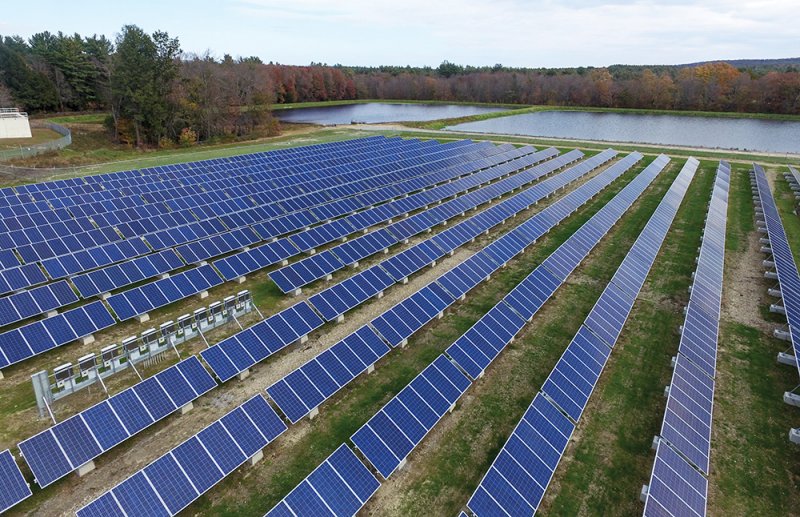
A 3,800-panel solar array installed by the town of Peterborough. Courtesy photo.
Town Administrator Rodney Bartlett calls Peterborough “a community that cares about itself,” and the evidence can be seen in everything from the town’s approval of $20 million in downtown improvement projects to its support of local businesses hit hard by COVID-19.
Despite the pandemic, the picturesque town framed by mountains and nestled along the Contoocook River continues to invest in the community, including replacing the historic Main Street Bridge and updating the town library, the first tax-supported free public library in the country. A 10-year, $4 million road maintenance program is also ongoing, part of an infrastructure improvement plan meant to “help Peterborough be more attractive for new business,” Bartlett says.
Some area businesses are also thriving, in part, because of the pandemic. SoClean, the manufacturer of sleep equipment maintenance devices, is expanding its line to include air purifiers and device disinfectors aimed at killing viruses and bacteria.
Pharmaceutical company MilliporeSigma, in nearby Jaffrey, is hiring hundreds as it boosts production of filters for use in vaccines for COVID-19.
This is also a community with a workforce that could more easily adapt to the new remote reality of the pandemic as roughly one-third of Peterborough workers are home-based entrepreneurs or telecommuters, according to a fall 2015 survey of residents by the Peterborough Economic Development Authority. Many work for corporations in other parts of the country or in Europe, while others run their own home-based craft or design businesses.
Rallying Behind Small Businesses
Peterborough has not been immune from the economic effects of the pandemic, which has affected many smaller businesses in a town known for its quaint eateries, antique emporiums and arts attractions.
However, the public and private sectors jumped in to help. The town deployed members of the Economic Development Authority to visit businesses in town, twice, to make sure all were aware of federal COVID-related lending opportunities and that they had adequate masks and distance signage, says Community and Economic Development Coordinator Karen Hatcher. When Gov. Chris Sununu issued an emergency order allowing outdoor dining, town officials “immediately created a process by which our restaurants could be permitted to do that safely,” she adds. “Within two or three weeks, we had 17 restaurants permitted and operating.”
A GoFundMe campaign to save the 106-year-old Peterborough Community Theatre, where attendance fell 95 percent because of COVID, surpassed its $13,300 goal. Another one, for the iconic Harlow’s Pub on School Street, was nearing its $25,000 goal as of early September.
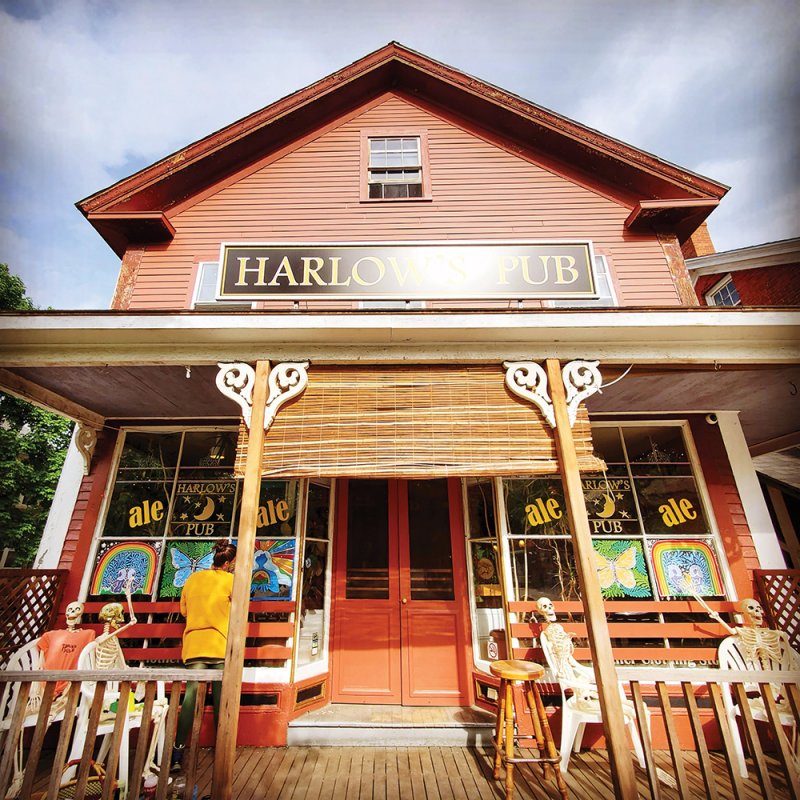
Harlow’s Pub launched a GoFundMe campaign to help save the business. Courtesy photo.
A group of angel investors, Our Town Capital, formed in 2017, invited struggling business owners to pitch their ideas to receive funding to keep them afloat. The Our Town Networking Group and Think Tank, also founded in 2017, came to the aid of struggling business owners by helping them form new business plans and providing education, advice and a sounding board at its twice-monthly meetings.
“What we’re seeing is that the community is rallying around the community and making sure we don’t lose any of them,” Hatcher says, “Every business is important to us.”
Adds Virginia “Ginks” Leiby, lead office volunteer coordinator at the Greater Peterborough Chamber of Commerce, “Peterborough has a strong business community that is well respected and that has many different outlets for working together. They don’t just rely on the town or the Chamber or this club or that club. They’re doing a good job of partnering together.”
One beneficiary of that cooperative spirit is Pierre H. Fabre, owner of Vicuña Chocolate Shop & Specialty Café on Main Street. A trained architect from Mexico, Fabre had purchased the business in November and was open only a few months before the pandemic struck.
“Because we were not in the best position, it hit us very hard,” he says. The business went from seeing 20 to 40 customers per day with an average sale of $20 to four to six customers spending about $7 each, he says. With part of Main Street closed because of the bridge replacement, foot traffic fell and Fabre made the difficult decision this summer to close and regroup.
He turned to Hatcher for help, as well as to the chamber and the Our Town Networking Group and its founder, Lee Davis.
With their help, he created a new business plan—one that includes more marketing, a wholesale license and the addition of ice cream to the menu. He hopes to reopen soon and hire back his one worker, now on unemployment. “My dream is to once again say ‘welcome’ to our customers and give them the opportunity to taste our chocolate and ice cream,” Fabre says.
Davis, who heads the bookkeeping and business solutions firm Lee Davis & Company, started the networking group at the urging of the chamber. The group includes bankers and business leaders from the community and works with the NH Small Business Development Center to help local small businesses, with a recent focus on Main Street shops.
Davis says the group can provide both moral and financial support to small business owners like Fabre. “Pierre has a real opportunity to do well during the holiday season with coffee and chocolates,” he says. “If you put the combination together of what the local merchants are going to do and Our Town Capital that really supports local businesses, Peterborough has a model where they take care of their own.”
A History of Adapting
The town’s bootstrap approach to economic hardship is ingrained in the community, which has a history of adapting and reinventing its economy. Peterborough, like many New England communities, was once a prosperous mill town, boasting cotton factories, paper mills, sawmills and gristmills in the 1800s and 1900s.
When many of those mills went south—in some cases, literally—the town had to reinvent itself and in the 1980s became the per capita magazine production capital of the world, home to such computer publications as “BYTE.”
When the publishing industry, too, started to languish, Peterborough found itself struggling again (though Yankee Publishing is still operating in neighboring Dublin). Adding to those woes was Brookstone, the giant specialty retailer that moved to town in 1969 but relocated to Merrimack in the face of its own financial pressures.
When Bartlett came to town in 2006, “the next three years were very difficult,” he says. Some longtime businesses in town, like NH Ball Bearing, remained and even grew, but “some of the original manufacturers in town were leaving,” he says. “Our industrial park area had a vacancy rate of 60 to 70% empty.”
Once again, Peterborough rebooted, combining a push for growth with a desire for sustainability.
Industrial developer Charles “Chub” Whitten, principal of Juniper Advisory Services, acquired much of the vacant space in the industrial park—Vose Farm Business Center— and stepped up marketing and offered attractive lease and rental costs, according to Bartlett.
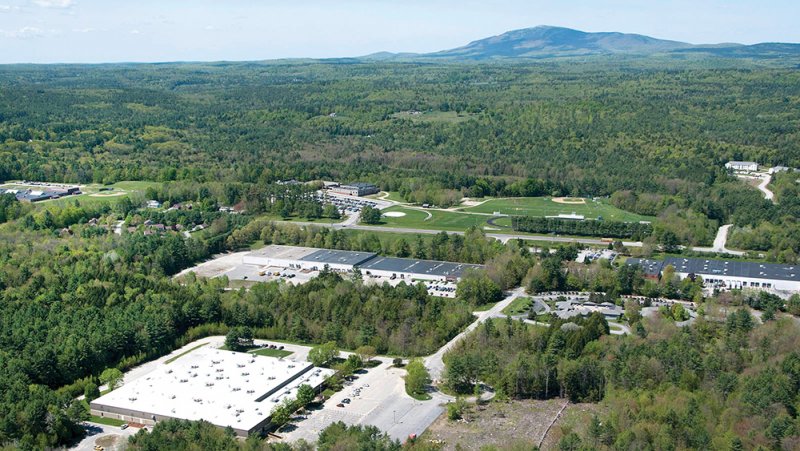
Vose Farm Business Center is a vital economic hub for Peterborough. Courtesy photo.
“This paralleled our effort on sustainability and the use of renewable fuels, primarily the wood pellets from New England Wood Pellets in Jaffrey and a new Peterborough start-up wood pellet furnace installation firm, Froling Energy,” he adds. “As the new businesses filled the industrial park they found employees quickly, as the many commuters decided to work closer to home, and home was Peterborough.”
Investing in the Future
Eventually, the town built a 3,800-panel solar array to power its municipal buildings, installed wood pellet boilers in the library, police station, community center and other buildings and now calls itself “the town powered 100 percent renewably.”
MAxT Makerspace, a shared working space for makers and an entrepreneurial incubator, opened in a small retail space on Jaffrey Road in 2015, providing a place for the many arts- and trades-minded entrepreneurs in town to gather and have access to tools and materials they wouldn’t have at home. It proved so popular, MAxT moved to a larger warehouse space on Vose Farm Road in 2018.
Downtown Peterborough’s largest office building, the Guernsey Professional Building, was extensively renovated in 2014 and 2015 to create more office space and executive suites and is now full, according to Hatcher.
Prime Alternative Treatment Centers, a medical marijuana cultivation site, opened on Vose Farm Road in 2016. SoClean moved its headquarters into the old Eastern Mountain Sports building in 2018, and the Vose Farm Business Park is now full, according to Bartlett.
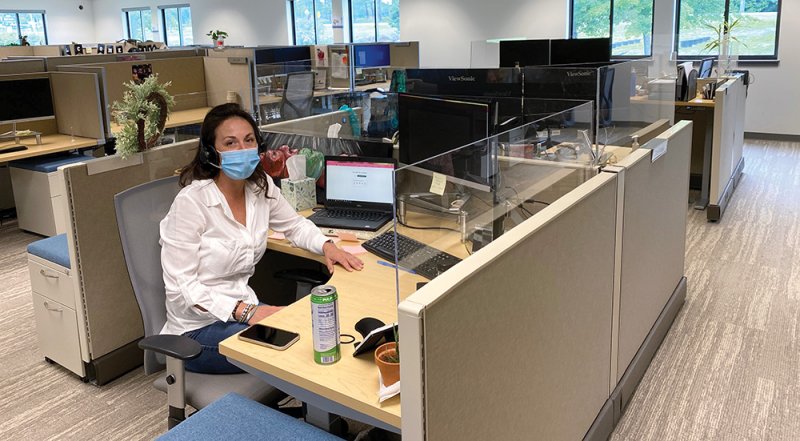
The interior, of SoClean, located at the Vose Farm Business Center. Courtesy photo.
Cranberry Meadow Farm has been renovating a historic home on Old Street Road with plans to open an eight-room inn with flower and vegetable gardens in 2021.
Ivy Vann, a certified planner who chairs the town’s Planning Board and is also a state representative, says much of the growth stems from “the desire of people in charge of these businesses to live in an attractive area.”

Cranberry Meadow Farm’s Inn on Old Street Road. Courtesy photo.
And that comes back to Peterborough being a community willing to invest in itself, including public support of municipal projects. Bartlett says voters at Town Meeting have consistently supported projects like the rebuilding of the Main Street Bridge and Peterborough Town Library.
The original library building, dating back to 1833, is being preserved, according to Hatcher, with newer sections being taken down and replaced to provide a sustainably climate-controlled, ADA-compliant facility that “will meet the needs of all the people who would use it, including remote workers and students.”
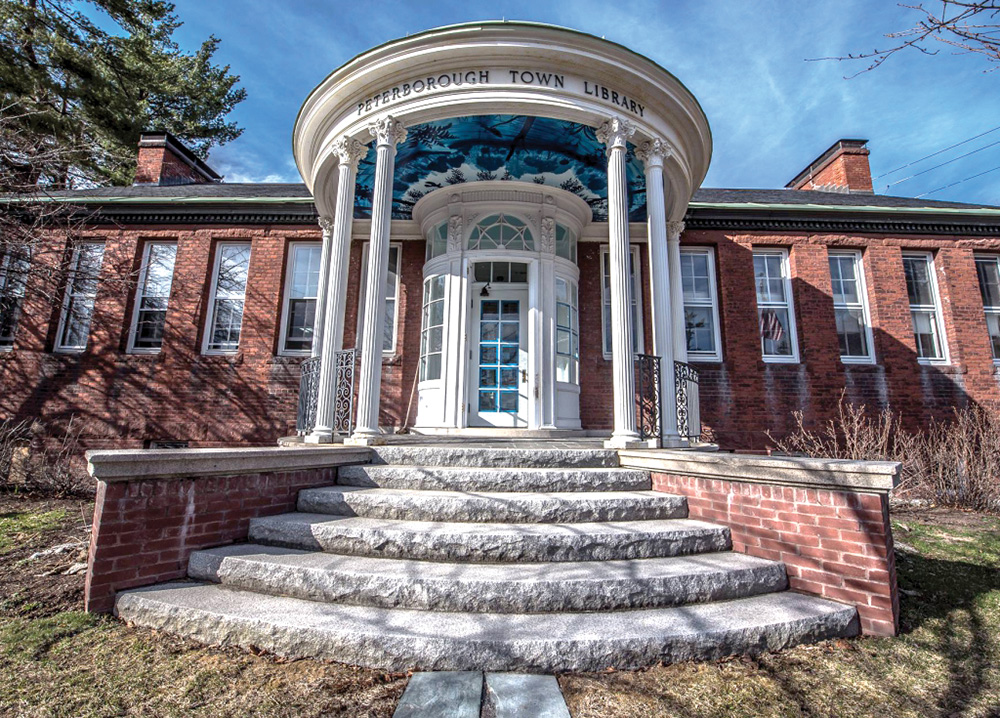
The Peterborough Town Library. Courtesy of the town of Peterborough.
The town passed a bond for $3 million toward the $8 million project, Hatcher says, with the remainder raised through donations and grants by the nonprofit 1833 Society. Ground was broken this summer with work expected to be complete by the fall of 2021.
A contract to rebuild the nearby stone arch Main Street Bridge was awarded in January, Bartlett says. Eighty percent of the $6.5 million cost is coming from the Federal Highway Administration, via the NH Department of Transportation, with the remaining 20% covered by a bond article passed by the town.
Surviving COVID
Work on both projects is also helping the downtown’s small retailers and restaurants that have been hardest hit by the pandemic. “You’ve got the construction workers here, the engineers, the suppliers, they all spend some time in the downtown,” says Bartlett, “whether at the [Peterborough] Diner or the Toadstool Bookshop. It’s not as busy as normal, but this may be the new normal.”
A new normal is also what many of Peterborough’s cultural and arts organizations are now seeking, as the pandemic cuts into indoor performances and threatens annual festivals like Children and the Arts, which canceled its May event this year, and the fall foliage festival Peak into Peterborough, sponsored by the chamber, which has canceled all events until further notice.
The Peterborough Players canceled its 2020 summer season because of COVID. Monadnock Music, which sponsors live performances and music education, modified its summer schedule to be largely virtual. The Monadnock Summer Lyceum streamed this summer’s speakers series live.

The cast of “She Loves Me” at the Peterborough Players, summer 2019. The Players canceled its 2020 summer season due to COVID. Courtesy photos.
The town is also home to the Monadnock Center for History and Culture, which now requires visitors to wear masks and is asking “citizen historians” to help document the experiences of local people during the pandemic through photos, writings and video.
Workforce and Housing Challenges
Aside from COVID, Peterborough faces many of the same challenges as other municipalities in the state, like lack of workforce and housing.
Parents staying at home to school their children have cut into the already tight labor force, according to Hatcher, and the lack of affordable housing options and a tight rental market thwart efforts to attract outside workers.
Vann says she is converting a single-family home into a three-family, “and at least once a week someone calls me to ask when the apartments are going to be ready and what I’m going to charge. Things don’t show up on the open market. They get passed hand to hand.”
The town’s new overlay zoning districts, established in 2014 and 2017, have helped, Vann adds. She points to a parking lot that belonged to a former Catholic Church, assessed at $47,000, that because of the overlay district became the site of eight homes worth $2.6 million, resulting in $80,000 in annual taxes being paid to the town.
Hatcher says a 30-member task force was formed last fall to examine housing issues and engage the community to explore ways to develop “the entry level or starter housing that allows young people to get a foothold in our community.”
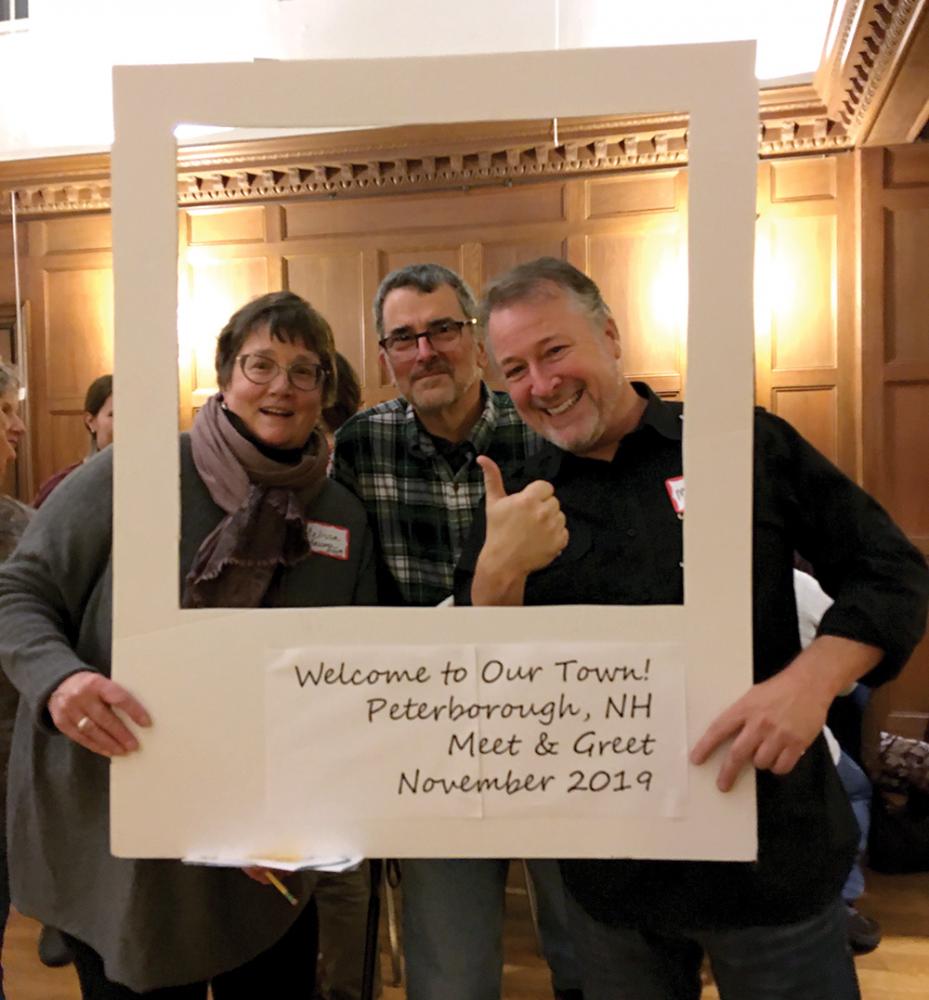
Guests at a Peterborough Welcome Team meet and greet event in November 2019. Courtesy of the town of Peterborough.
The town is also striving to attract, and keep, new residents. Four years ago, Hatcher launched the Peterborough Welcome Team, patterned after Welcome Wagon, to reach out to newcomers. The Monadnock Nonprofit Network, which she also founded, helps support the many nonprofits serving the area. “What makes Peterborough special is the community’s willingness to tackle hard issues and have deep conversations as a community,” she says. “It’s this perfectly placed sweet community. It’s not perfect, but it’s engaged and it recognizes its imperfection and is willing to work on it.”
